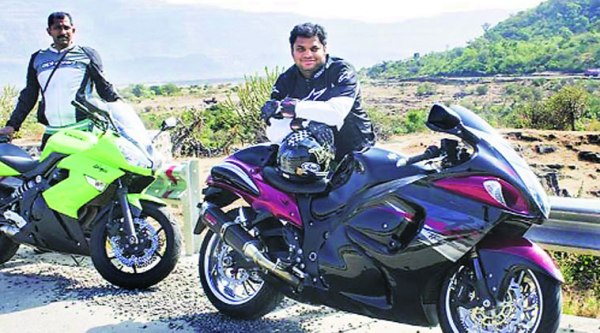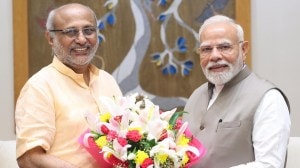 Sagar Apte, an IT professional who has been using such a bike for the last few years, says riders should follow the rules.
Sagar Apte, an IT professional who has been using such a bike for the last few years, says riders should follow the rules.
Heavy motorcycles zipping past the lanes and bylanes of Pune has become a common sight of late. Figures from the Regional Transport Office (RTO) show the number of super bikes — bikes with 600 cc capacity or more and costing over Rs 1 lakh — has tripled in the last three years. While a super bike is a fashion statement for its owner, traffic planners and police find these bikes, much associated with open roads, unsuitable for city areas. Both the RTO and the traffic police express helplessness in regulating the free movement of these bikes on city roads, blaming ambiguity in the legal system.
Since 2011, the number of super bikes has seen a steady rise in Pune, with 6,820 such bikes running in the city as of August 31. The RTO had registered 2,151 such bikes in 2011, 3,610 in 2012 and 5,696 in 2013.

Jigar Gavali, owner of Platinum Auto, says a majority of the owners of such bikes are either working in the information technology sector or are second-generation businessmen. “Ease of riding and comfort are the major reasons for people to go for such bikes. Also, events like competitions, group outings organised by companies have soared the popularity of such bikes,” he says.
Story continues below this ad
According to Gavali, Pune can easily have 25-30 groups who regularly go for rides in and around the city.
Nandu Chitnis, who has been riding super bikes for long, says rising incomes have made the entry-level price of Rs 1 lakh for such bikes affordable for many. “Many families have double incomes, so affording such bikes is not a very big issue for them,” he says.
While style and comfort are attracting more and more people to such bikes, traffic police say such bikers have a tendency to both speed and drive recklessly, making them dangerous for city roads. The traffic police had a few years ago undertaken a special drive to curb the nuisance of such bikes and initiated stringent action against defaulters. Such drives are conducted sporadically, but irregularly. Heavy duty bikers in the USA are, incidentally, called “organ donors” because of the high accident rates involving super bikes.
Pranjali Deshpande, project manager of the Institute for Transportation and Development Policy (ITDP), says in countries like the US such bikes have designated zones, like down town areas. “For inter city transport, safety and control are of paramount importance. These machines are built for speed and are thus not suitable for city roads. In cities like Pune, with mixed land-use pattern, such vehicles can prove to be dangerous,” she adds. Both the RTO and the traffic police pass the buck on eath other when it comes to controlling the movement of such vehicles.
Story continues below this ad
Sarang Awad, Deputy Commissioner of Police (Traffic), says the RTO, being the licensing authority, should decide where such vehicles can ply. “We take action against night racing and speeding but we can’t decide which vehicle will enter the city and which will not,” he said.
Newly appointed Transport Commissioner Mahesh Zhagade, on the other hand, says the Motor Vehicles Act does not differentiate in the two-wheelers category. “We are the licensing authority and we only issue licence once all the safety standards specified by the government are met. Local authorities should control the movement of such vehicles,” he says.
Sagar Apte, an IT professional who has been using such a bike for the last few years, says riders should follow the rules. “We are a group of 20 bikers and go out biking every weekend on the highways around the city. Within the city limits, we do follow the rule as it is important for our safety too,” he says.
 Sagar Apte, an IT professional who has been using such a bike for the last few years, says riders should follow the rules.
Sagar Apte, an IT professional who has been using such a bike for the last few years, says riders should follow the rules.







